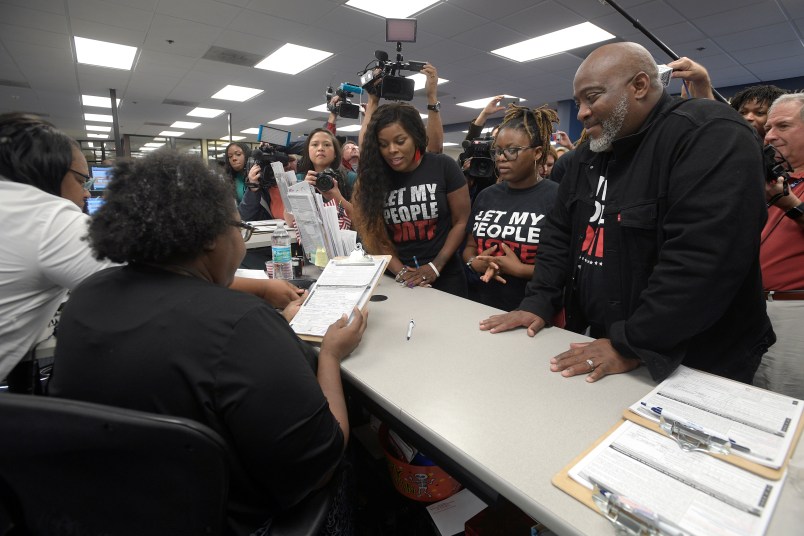The Supreme Court has before it a request from voter groups that it intervene in the high-stakes legal fight over a 2019 Florida law restricting the voting rights of ex-felons.
The parties challenging the law filed the emergency request with the Supreme Court on Wednesday. On Friday, Justice Clarence Thomas, who oversees the appellate circuit that includes Florida, asked that the state file a response to the request by next Tuesday.
A district court had partially blocked the controversial law in May, in a ruling that concluded the law amounted to an unconstitutional poll tax. Now that decision is on hold while the full U.S. Court of Appeals for the 11th Circuit considers the case.
The law requires that ex-felons pay all court fees and fines before they register to vote. A trial this spring on the law made clear that the state had not worked out a system for keeping track of what court financial obligations Florida’s ex-felons still owed. The now-frozen ruling by U.S. District Judge Robert Hinkle ordered the state implement a system waiving the requirement for any ex-felon who could not afford to pay off the court fees. Hinkle also required that the state provide a request form ex-felons could use to confirm what fees they still owe; if the state did not respond within 21 days, those ex-felons were to automatically become eligible to vote, under Hinkle’s order.
In their request for a Supreme Court intervention, the law’s challengers said that the voting rights of some 750,000 ex-felons are in limbo with the 11th Circuit move to put the trial judge’s order on hold. The issue will not be cleared up until well after Florida’s July 20 registration deadline for its August primary, the challengers said, as the appeals court scheduled oral arguments for August 18, the day of the primary itself.
“The district court remedied the chaos inherent in the pay-to-vote system. The Eleventh Circuit resurrected that chaos, and then multiplied it,” the challengers said.
The confusion is compounded, the challengers said, by the fact that the shipment of overseas ballots had already started when the 11th Circuit issued its hold on Hinkle’s ruling.
“Indeed, vote-by-mail is already underway,” the challengers said, while noting that the Floridians affected by the 11th Circuit’s move have no way of determining whether they’re now ineligible to vote. “Now they face conflicting appellate court decisions about their rights with a cloud of the State’s criminal power hanging over their head—a threat those who have served time and come straight with the law wish deeply to avoid.”
Florida secured the hold on Hinkle’s ruling by using a very rare procedural tactic. Rather than take its appeal to a three-judge panel from the circuit court, it skipped that step and asked the entire appeals bench — which was recently flipped to a majority GOP appointees — to take up the case.
The 11th Circuit move last week to put the ruling on hold was at odds with how the 11th Circuit handled Florida’s request in February that it freeze a preliminary order by Hinkle. That court rejected that request, but, since then, President Trump has further tipped the balance towards conservative judges on the circuit court.
The right-leaning majority on the Supreme Court is not known for intervening in election cases in ways that make voting more accessible. The current request in the Florida case, however, cites a principle known as Purcell (named after a 2006 case) that says that courts should avoid disrupting voting regimes when an election is near.
“It is far too late in the day for this Court to permit hundreds of thousands of eligible voters to be denied the franchise merely to avoid treading upon the opaque internal workings of the court of appeals,” the Florida challengers said in their request.



